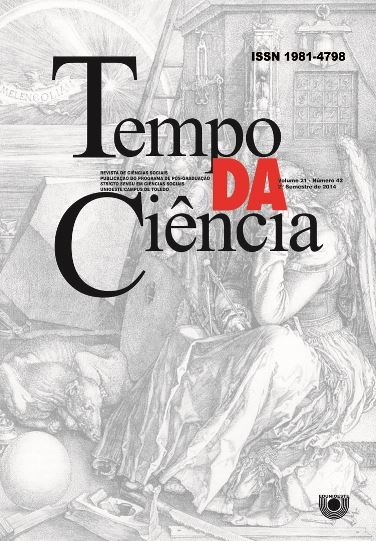BENTO ESPINOSA (1632-1677) E A TEORIA DAS FORMAS DE GOVERNO
DOI:
https://doi.org/10.48075/rtc.v21i42.12629Palavras-chave:
Bento Espinosa, Formas de governo, Monarquia, Aristocracia, Democracia.Resumo
A teoria das formas de governo é um dos temas mais recorrentes nas obras dos principais teóricos da política, pois, desde os antigos – Platão, Aristóteles – passando pelos fundadores do pensamento político moderno ocidental – Maquiavel, Hobbes, entre outros – existe a preocupação teórica de definir e fundamentar – e, em muitos casos, avaliar – as diferentes formas pelas quais é possível governar. Partindo do fato de que o filósofo holandês Bento Espinosa está ausente tanto do famoso livro do jurista italiano Norberto Bobbio, A teoria das formas de governo (1976); quanto da coletânea do cientista político brasileiro Francisco Correa Weffort, Os clássicos da política (1991); a proposta aqui é retomar algumas das principais teorias sobre as formas de governo – seguindo o esquema elaborado por Bobbio, que se concentra nas duas questões: (1) quem governa? (2) como governa? – e apresentar a teoria elaborada por Espinosa – sobre a monarquia, a aristocracia e a democracia – explorando quais as diferenças e semelhanças da sua tipologia em relação às anteriores. O objetivo principal é justificar a inclusão de Espinosa entre os “clássicos da política”, e, para tanto, pretendemos apresentar seu pensamento político, analisando em que medida pode ser considerado “inovador”, mas também explorando os aspectos nos quais não foi capaz de “romper” com sua própria situação política, social, histórica, cultural e religiosa.Downloads
Publicado
Como Citar
Edição
Seção
Licença
Aviso de Direito Autoral Creative Commons
Política para Periódicos de Acesso Livre
Autores que publicam nesta revista concordam com os seguintes termos:
1. Autores mantém os direitos autorais e concedem à revista o direito de primeira publicação, com o trabalho simultaneamente licenciado sob a Licença Creative Commons Attribution que permite o compartilhamento do trabalho com reconhecimento da autoria e publicação inicial nesta revista.
2. Autores têm autorização para assumir contratos adicionais separadamente, para distribuição não-exclusiva da versão do trabalho publicada nesta revista (ex.: publicar em repositório institucional ou como capítulo de livro), com reconhecimento de autoria e publicação inicial nesta revista.
3. Autores têm permissão e são estimulados a publicar e distribuir seu trabalho online (ex.: em repositórios institucionais ou na sua página pessoal) a qualquer ponto antes ou durante o processo editorial, já que isso pode gerar alterações produtivas, bem como aumentar o impacto e a citação do trabalho publicado (Veja O Efeito do Acesso Livre).
Licença Creative Commons
Esta obra está licenciada com uma Licença Creative Commons Atribuição-NãoComercial-CompartilhaIgual 4.0 Internacional, o que permite compartilhar, copiar, distribuir, exibir, reproduzir, a totalidade ou partes desde que não tenha objetivo comercial e sejam citados os autores e a fonte.

